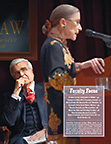Introducing Smita Narula
Assistant Professor of Clinical Law
Printer Friendly Version You won’t find Coca-Cola in Professor Smita Narula’s refrigerator—Narula, 33, a faculty director of the Center for Human Rights and Global Justice (CHRGJ), won’t buy it because the bottling process in her native India usurps the natural water supply. Nor will you see a diamond engagement ring on her finger—her husband, Richard Green, 36, “had to find something that doesn’t involve child labor abuses (like the production of diamonds), armed conflict or other human rights violations,” she says, with self-deprecating humor.
You won’t find Coca-Cola in Professor Smita Narula’s refrigerator—Narula, 33, a faculty director of the Center for Human Rights and Global Justice (CHRGJ), won’t buy it because the bottling process in her native India usurps the natural water supply. Nor will you see a diamond engagement ring on her finger—her husband, Richard Green, 36, “had to find something that doesn’t involve child labor abuses (like the production of diamonds), armed conflict or other human rights violations,” she says, with self-deprecating humor.
Narula simply stands by her beliefs, wherever they lead her. Though her family is considered upper caste—“It goes against me to even identify which caste; I don’t believe in them,” she says—Narula has made the cause of discrimination against the so-called lowest caste, the Dalits, her own. India officially abolished the practice of untouchability in its 1950 constitution, but the Dalits are still segregated from the upper castes, still live in extreme poverty and are forbidden to intermarry, hold property or even drink from the same well as those of higher castes. In 1999, Narula spent months in India for Human Rights Watch (HRW) interviewing Dalits about their plight. The result: her award-winning book, Broken People: Caste Violence Against India’s Untouchables. For her work, as well as her role in bringing together human rights activists in India to form the National Campaign for Dalit Human Rights, a former chief justice of the Supreme Court of India awarded her the Human Rights Award for Outstanding Research and Writing.
Because of Narula’s exposé and the work of the campaign, the Dalits were put on the agenda at the 2001 World Conference Against Racism, held in South Africa, says Sam Zarifi, research director of the Asia Division at HRW. “What sets her apart,” he says, “is that she combines the passion of an activist with the dispassionate analysis of a top academic lawyer.”
Take the case of the estimated 2,000 Muslims massacred in a bloody three-day slaughter in the state of Gujarat, India, in 2002. Government officials portrayed the incident as a spontaneous riot that occurred in retaliation for an earlier attack on Hindus that was blamed on Muslims. Narula traveled to India for HRW to interview hundreds of survivors and police. Her report, “We Have No Orders to Save You,” concluded that the Indian government actually engineered the killings, having Muslims cut and set on fire with kerosene lamps. Her report made waves in the international community. In 2005, the United States barred Narendra Modi, the Gujarat chief minister, from visiting.
Narula was born in Delhi to Sudershan, now 65, the director of medical services for the United Nations, and Hans, now 70, who worked for UNICEF and is retired. Subject to their parents’ frequent transfers, Narula and her brother spent their earliest years in Delhi, Jakarta and Kabul. When Narula was nine, the family moved to New York City, where she attended the U.N. International School. She earned a combined bachelor’s and master’s degree at Brown University in international relations and international development, graduating magna cum laude at the age of 20. She went on to get her law degree at Harvard, where she was the editor of the Harvard Human Rights Journal, and became interested in caste discrimination. After law school, she joined HRW. “I feel my relative privilege very strongly,” she said. “Any measure of privilege brings with it responsibility.”
Narula came to NYU in 2003 to become the executive director of CHRGJ and to coteach the International Human Rights Clinic. This year, she was made an assistant professor of clinical law and a faculty director of the CHRGJ. Professor Philip Alston, the chair and faculty director of the CHRGJ, says of Narula: “There are few people who are as well connected and able to put students in contact with that network.”
In 2005, Narula and her clinic students published “The Missing Piece of the Puzzle,” examining the role that caste discrimination plays in the current conflict in Nepal. Many of the recommendations in the report have been raised in parliamentary meetings of the European Union and been incorporated into the mandate of the U.N. in Nepal. Along with Jayne Huckerby, CHRGJ’s research director, Narula and her students are now concentrating on a report critiquing the use of racial profiling and lethal force in the shoot-to-kill policies that various governments have enacted or authorized in the wake of 9/11.
Narula’s scholarship similarly takes on timely social issues. In a recent article in the Columbia Journal of Transnational Law, Narula asks whether corporations and international financial institutions can be held accountable for violations of the right to food and other social and economic rights under international law.
Such focus and intensity is typical of Narula, says her husband of three months; they were married at the U.N. Chapel last June. “She approaches her students, her writing, her activism all the same way,” he says. “Fully engaged.”
—
